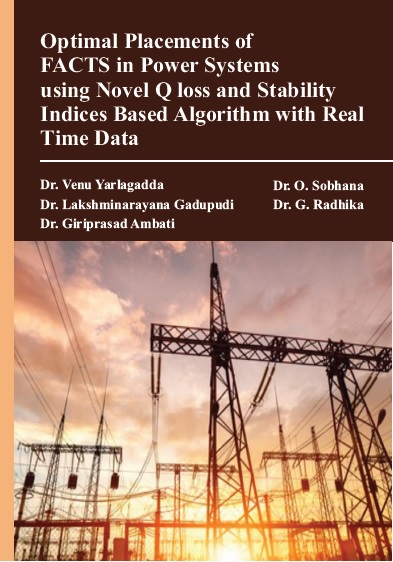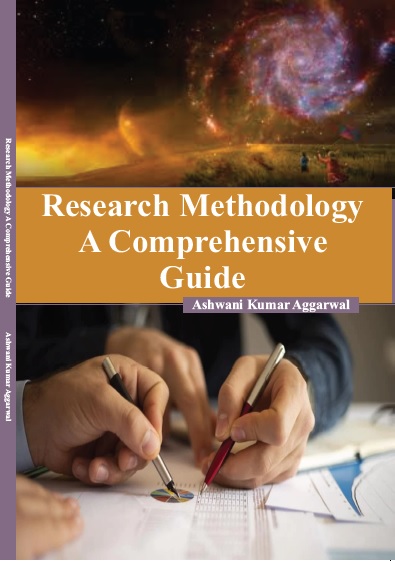SCIENCES AND ENGINEERING

Optimal Placements Of Facts In Power Systems Using Novel Q Loss And Stability Indices Based Algorithm With Real Time Data
by Dr. Venu Yarlagadda
ISBN Number : 978 - 93 - 91478 - 23 - 0
Authors Details
| Author Name | Image | About Author |
|---|---|---|
| Dr. Venu Yarlagadda |  |
Venu Yarlagadda is obtained his M.Tech and Ph.D Degrees in the eld of Electrical and
Electronics Engineering in 2015 from JNTU, Hyderabad, Telangana. He has Published ten
Springer book chapters, four IEEE Papers, one book with LAP and about twenty
International Journals and conferences and one published one patent. His areas of Interest are
Flexible A.C Transmission Systems, Power Quality, Power System Analysis and
Deregulation, Articial Intelligence, machine learning and other Modern methods of
optimization applications to Electrical Engineering |
| Dr. Lakshminarayana Gadupudi |  |
Lakshminarayana Gadupudi currently working as an Assistant Professor in Department of
Electrical and Electronics Engineering, VNR Vignana Jyothi Institute of Engineering and
Technology, Hyderabad. He completed M.E. (Industrial Electronics) form The Maharaja
Sayajirao University Baroda, Vadodara, Gujarat in 2008 and Pursuing Ph.D. from Acharya
Nagarjuna University, Guntur, Andhra Pradesh, India. He guided and presently guiding
M.Tech Scholars and B.Tech projects. He has more than 15 SCI, Scopus Indexed Journals
and Book Series. He is life number in ISTE and IAENG societies. His research interest
includes Power Quality and Voltage Stability Improvements, FACTS, Power Electronics, HVDC, Renewable
Source based Electric Vehicles and Mezzanine Technologies |
| Dr. Giriprasad Ambati |  |
A.Giriprasad Received the B.Tech degree in Electrical and Electronics Engineering from
V.R. Siddhartha Engineering College, , Vijayawada, AP, India in 2000 and the M.Tech power
systems from JNT University Hyderabad, AP,India in 2005. He has 16 Years of teaching
experience. He has been working as Associate Professor and HOD in EEE Department, St
Peter's Engineering College, Hyderabad since 2007. He has published 4 research papers in
national and international conferences and journals. He guided 5 M.Tech Scholars and
presently guiding 5 M.Tech. Scholars. His areas of interest are Gas Insulated Substations and
High Voltage Engineering. |
| Dr. O. Sobhana |  |
O. SOBHANA Received the B.Tech degree in Electrical and Electronics Engineering from
Sri Vidyanikethan Engineering College, Tirupathi, AP, India in 2003 and the M.Tech power
electronics and Industrial Drives from JNTCEH,Telangana,India in 2012.She has 10 Years
of teaching experience. She has published 8 research papers in national and international
conferences and journals. Her Research interest are Diagnosing faults in Power transformer,
Prediction of faults using Articial intelligent algorithms and applications of Renewable
energy technologies. |
| Dr. G. Radhika |  |
Dr. G.Radhika obtained her B.Tech Degree from Godavari Institute of Engineering and
Technology, AP in 2002 and M.Tech from JNTU, Hyderabad in the year 2006. Obtained her
Ph.D degree in Electrical Engineering from JNTU, Hyderabad in 2018. She published 25
papers in various International and National Conferences and Journals. She guided 12
M.Tech scholars and she is life member of ISTE. She has 19 years of teaching experience and
presently working as Senior Assistant Professor in the Department of Electrical and
Electronics Engineering in VNR Vignana Jyothi Institute of Engineering and Technology,
Hyderabad. She has the research interest in High Voltage Engineering and Power Systems . |
Book Description
The management of power systems has become more difcult than earlier because power systems are operated closer to security limits, environmental constraints restrict the operation of transmission network, the need for long distance power transfers has increased and fewer operations are engaged in the supervision and operation of power systems. Voltage instability has become a major concern in many power systems and many blackouts have been reported, where the reason has been voltage instability. Voltage stability is concerned with the ability of the power system to maintain acceptable voltages at all system buses under normal conditions as well as after being subjected to a disturbance. Thus the analysis of voltage stability deals with nding the voltage levels at all buses in the system under different loading conditions to ascertain the stability limit and margin. Several works have been conducted recently for the prediction of voltage stability and collapse based on the steady state analysis; some of these are focus on static voltage stability analysis with the use of instability measuring indicators. In the book IEEE 30 bus and real time AP State 124 bus test systems are simulated using MATLAB Programming and MIPOWER, POWERWORLD Software's. Contingency ranking has been made for the n-1 contingency case and identied severe most contingency based on various voltage stability indices. The optimal placement of shunt compensator is identied using P-V curves, Lindex and Voltage Collapse Proximity Index (VCPI) - indices.The optimal placement is also obtained using FVSI and LLI (Novel Proposal) and compared with previous methods.The optimal size has been obtained by converting the critical bus into voltage controlled bus using ctitious generator, which generates only reactive power for maintaining that bus voltage nearly equal to 1.0 p.u. The test results have been compared with the reactive power loss based iterative solution. The subsequent chapter deals with the optimal placement of Series compensator. The minimum of Lmn and FVSI are identied for the severe most contingency for optimal placement of series compensator. The control algorithm is developed for nding optimal size of the series compensator by assuming initial value for the degree of compensation and suitable step size. The optimal results have been presented using the proposed algorithm. The comparisons of test results have been presented using xed shunt compensator and SVC for IEEE 30-bus test system. Lastly the control algorithm is developed for nding optimal size of the series and shunt compensators for their coordination control. By using xed series compensator value equal to (10 to 20% it is based on case) and tuning is done for the shunt compensator by assuming initial value of the shunt compensation and suitable step size based on Reactive Power Loss of the system.The optimal results have been presented using the proposed algorithm of coordination control in which series controller is acting as supplementary controller and shunt controller as Master controller.The comparison of test results have been presented for all type of compensators viz. shunt, series and coordination control for IEEE 30-bus test system.














